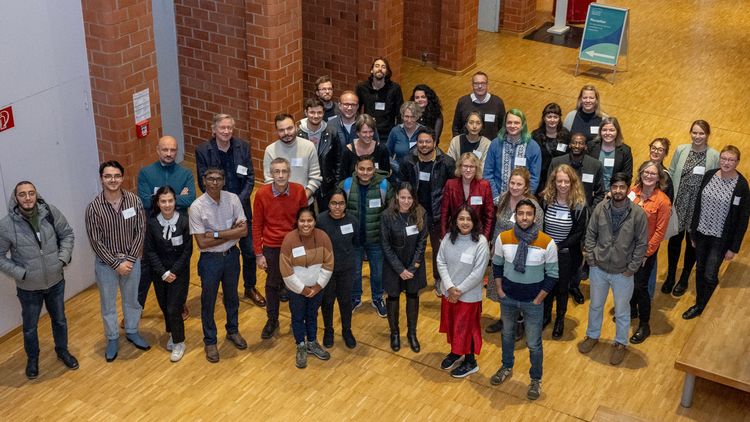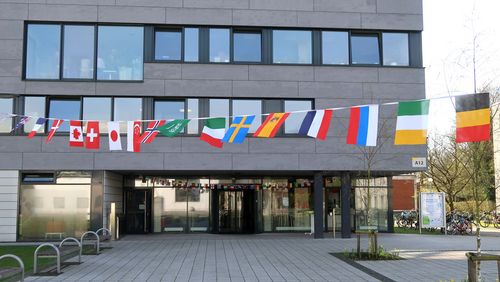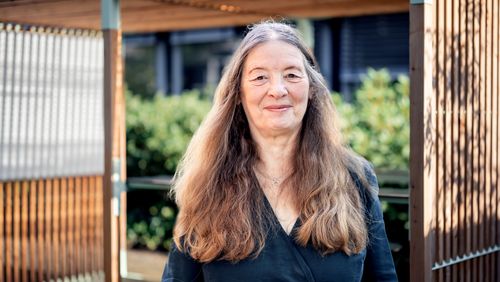International researchers are an integral part of the university community. But the decision to work far from home comes with its own challenges. Three doctoral candidates who were guests at this year's welcome reception for international doctoral candidates and researchers, organised by the International Office, share their stories.
“I wanted to do a PhD in paleoclimatology. On a website, there was a position advertised at the University of Oldenburg. I applied, had an interview – and that is how I got here”, says Anjana Gireesh Sandhya with a smile.
The doctoral candidate from southern India has been living in Oldenburg for eight months and is now in her “adaptation phase”, as she puts it. “At first, it was very difficult to get used to living here. The culture, the weather, the language, the people – everything is very different from home,” she says. But she eventually settled in with the help of her colleagues.
Sandhya works in the Marine Isotope Geochemistry research group led by Prof. Dr Katharina Pahnke at the Institute for Chemistry and Biology of the Marine Environment (ICBM). She is one out of around 280 international doctoral candidates currently enrolled at the university. She has also registered with the International Offices’s web portal for international researchers and doctoral candidates – along with around 180 researchers at all levels of qualification from 51 countries.
An internationally diverse group
By registering with the web portal, Sandhya has become aware of networking events such as the reception organised by the International Office to welcome international doctoral candidates and researchers to the university. As a member of this internationally diverse group, she “is an integral and indispensable part of the university’s community,” as the Vice President for Research and Transfer, Prof. Dr Christiane Thiel said at the event.
Kalel Luiz Rossi is also part of this community. Like Sandhya, the doctoral candidate from Brazil has left his comfort zone to pursue an academic career far away from home. He admits that Oldenburg isn’t exactly the place he has dreamed of. In fact, the scientist chose to work on his doctoral thesis in Oldenburg because of his supervisor Prof. Dr Ulrike Feudel, head of the Theoretical Physics research group at the ICBM.
They first met at a conference in Brazil and started working together. “I really wanted to do my PhD with her, she is a very good supervisor”, Rossi tells. Together with Feudel, he submitted a proposal and managed to secure funding from the German Academic Exchange Service (DAAD) for his research in Germany. Rossi has now been working at the university for almost two years.
“I enjoy my work, there are a lot of nice people and we have a great international network,” he says. “I also like the peaceful atmosphere in the city or just riding my bike.” But there are also many things he misses, such as “saying ‘hi’ to people on the street, just because you share the same vibe”, he says.
Excellent research culture
“Germany has its own way”, adds Januario Hossi from Angola, “but people cannot be compared.” Broadening his knowledge in the field of energy research while working in the Technical Chemistry research group at the Institute of Chemistry, led by Prof. Dr Michael Wark, is exactly what he wants: “The research culture is excellent, I have a very supportive supervisor and I’m learning a lot.”
Hossi has a clear goal: “I have chosen scientific research as my career,” he says. “And I would like to stay in Germany because of the opportunities here.” Having spent almost two semesters in Oldenburg, he has also come to appreciate the more worldly benefits of living in Germany – such as the public transport system or the cakes his colleagues bring to work from time to time.
For Sandhya from India, however, German food is still a bit of a challenge: she regularly joins her colleagues for lunch in the Wechloy canteen – although not every day, she stresses. But “eating together with my colleagues is good for the social life and for trying new things”, she says. “And I like trying new things.”






